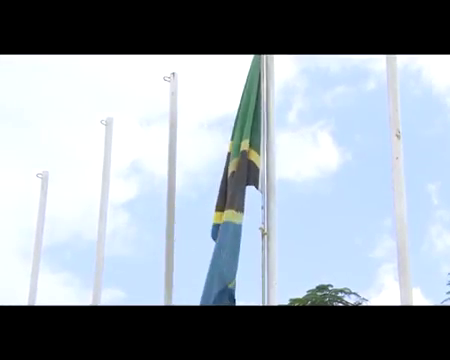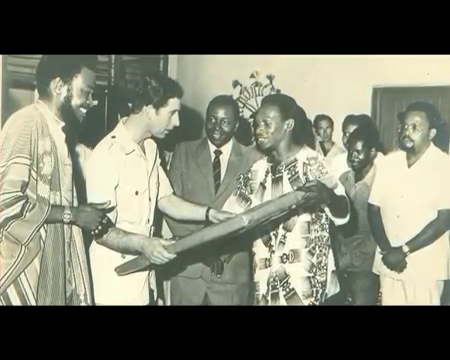JULIUS KAMBARAGE NYERERE
Nyerere was a Tanzanian statesman who worked hard for independence and later became president from the time of independence until he handed over power in 1985.
He was born in 1922 at Butiama, Musoma district, along the shores of Lake Victoria in northern Tanzania. His father Nyerere Burito was a local chief in the area. Nyerere's mother, Kambarage was one of his 22 wives and Nyerere took up his mother's name.
For his education, Nyerere went through Mwisanje primary school and then Tabora government secondary school and finally joined Makerere University College in 1942 at the age of 20 for a three years diploma course in education. He graduated in 1945.
He returned to Tanzania and began teaching History, English and Biology at St. Mary's college Tabora. His good work in teaching earned him the title of Mwalimu, meaning respectable teacher.
He later went to University of Edinburg in Scotland where he acquired a Master of Arts degree in history and administration. While he was abroad, Nyerere participated in politics as a student. He also learnt more of the attitude of the colonialists towards Africa. He therefore planned accordingly
He returned from Scotland in 1952 and in 1953 became the President of Tanganyika African Association (TAA), a political party of that time. TAA was a small association formed in 1929 but had branches countrywide. It was made up of farmers, teachers, doctors and other workers
A year after, he founded a real non- racial political party called the Tanganyika African national Union (TANU). As a leader of TANU, he organised branches for his party all over the country. The party's Swahili slogan was Uhuru na Umoja, freedom and unity. He even resigned from teaching to have more time for national politics.
In 1955, he represented his people to UN demanding political independence for Tanganyika. Members of the UN Trusteeship council were impressed with Nyerere's speeches and his approach to the issue of independence. Nyerere used to say that "We shall tell the British to grant us independence; if they refuse, we shall go to the UN; if we fail there we shall report them to God"[1]
In the same year (1955), he was elected as President of the Legico, which he had joined in 1953. Legico was a form of parliament which was largely composed of whites.
 He
resigned after 2 years because the Legico made not making strenuous effort
towards independence. Their approach was far different from what Nyerere
wanted. He was banned from making speeches all over the country. Even 12 TANU
branches were closed and Nyerere was tried in court but was found innocent.
He
resigned after 2 years because the Legico made not making strenuous effort
towards independence. Their approach was far different from what Nyerere
wanted. He was banned from making speeches all over the country. Even 12 TANU
branches were closed and Nyerere was tried in court but was found innocent.
In 1958, elections were conducted in the Legico and TANU emerged as the largest single party demanding for independence and for a non-racial democracy. Other participants in the elections were Europeans and Asians. TANU won 29 out of the 30 contested seats. Nyerere was appointed a Chief minister and later a Prime minister.
In the elections of 1960, TANU won overwhelmingly by scoring 70 out of the 71 seats contested in parliament. Tanu was a very popular party. Other parties which participated, in the elections were for Indians and Whites.
 In October
1961, Tanzania became independent with Nyerere as its Prime minister. Nyerere
surprised everyone when he resigned after seven weeks in power. He handed over
power to Rashid Kawawa. He
only returned to power in 1962 when a constitution was amended to make
Tanganyika a republic. He was elected president of Tanganyika in 1962 before
being elected president of the United Republic of Tanzania (Tanganyika and
Zanzibar) in 1964.
In October
1961, Tanzania became independent with Nyerere as its Prime minister. Nyerere
surprised everyone when he resigned after seven weeks in power. He handed over
power to Rashid Kawawa. He
only returned to power in 1962 when a constitution was amended to make
Tanganyika a republic. He was elected president of Tanganyika in 1962 before
being elected president of the United Republic of Tanzania (Tanganyika and
Zanzibar) in 1964.
Nyerere instituted the spirit of freedom and work i.e "Uhuru na Kazi" in Tanzania thus arousing more freedom and independence. He was a simple and hard workingman. "Nyerere was one African leader who understood the poverty of his people and reflected it in his lifestyle" wrote Fatima Meer.
It was Nyerere who advocated for federation of East African countries but later led to the formation of the East African Community in 1967.
Nyerere was among the 32 African leaders who participated in the formation of Organization of African Unity in 1963.
In 1964, he demonstrated the type of unity African states should follow by merging Zanzibar with Tanganyika to form Tanzania. This was after the bloody Zanzibar revolution that led to the over throw Oman Arab led government. The Afro‑shiraz party of Zanzibar and TANU also merged leading to CCM, Chama Cha Mapinduzi (Party of the revolution).

Nyerere is remembered for living to his word. " Tanzania cannot be fully liberated until the whole of Africa is liberated," he said.
Mozambique, Namibia, Zimbabwe and south Africa always remember Nyerere as a man who helped deliver them from colonial rule. Dar-es-salaam was the headquarters of the Frontline movement.
Nyerere pursued socialist economic policies for Tanzania immediately after the famous Arusha declaration in 1967. Ujamaa villages were established all over the country for national development. However, he later on dropped this policy in favour of capitalism.
Ugandans remember Nyerere for the step he took to liberate Uganda from the dictatorial regime of Idi Amin. The Tanzanian army and other Ugandans fought Amin's soldiers.
 Nyerere
created unity in Tanzania. 127 ethnic groups were united together with one
language.
Nyerere
created unity in Tanzania. 127 ethnic groups were united together with one
language.
In 1984, Nyerere was elected chairman of OAU a post he held for one year. He worked hard for better life of Africans. Many people only compared him with Great men like William Wilberforce, Abraham Lincoln, Gandhi and Nkrumah.
He retired as president of Tanzania in October 1985. Power was handed over to Hassan Mwinyi as president. Nyerere only remained as chairman of the CCM party until he died.
He was awarded honorary degrees in Zambia, Nigeria, Egypt, Zimbabwe and Uganda as well.
He was also appointed chairman of south-to-south co-operation a forum for engaging Developing Countries in dialogue among themselves and with their development partners. As chairman of this, Nyerere impressed it upon the developed countries that foreign debts for developing countries were getting out of hand and needed to be cancelled. This resulted into canceling of debts for some developing countries through an arrangement known as HIPC.
Nyerere also became mediator of the peace and reconciliation process in Burundi after the overthrow of president Nthibantunganya by Pierre Buyoya in 1996
The third world's most famous teacher lost the battle to the cancer of the blood known as Leukemia. This was in St' Thomas hospital in London on October 14th 1999 at the age of 77. With his wife Maria, he left five sons and three daughters.
QUESTION
Account for the success of independence struggle in Tanganyika.
Preamble
Define independence and give a brief background to Tanganyika as a colony. .
Give and explain factors that facilitated independence struggle in Tanganyika.
No other factors and no stand point required.
Tanganyika was at first a German colony then a British colony a year after the end of World War I. It got independence in 1961 under TANU leadership [Julius Nyerere]. Its transfer to independence was relatively smooth and this was due to the many reasons as discussed hereunder.
The existence of few white settlers in Tanganyika made the struggle for freedom relatively easy for nationalists therein.
Linguistic unity was equally important in the struggle to achieve freedom in Tanganyika.
Even during the British colonialism, Kishwahili remained a medium of instruction thus enabling the people of Tanganyika to easily exchange nationalistic ideas.
The role of the Maji Maji rebellion was instrumental in the choice of use of peaceful means of struggle to attain independence in Tanganyika.
The role of Tanganyika African Association (TAA) should also be mentioned.
The role of UNO was equally important in the liberation of Tanganyika.
Colonialism itself was self destructive in Tanganyika. It came to Tanganyika with bad laws, bad policies e.g. over taxation, forced labor, racism etc which created a class of aggrieved Tanganyikans.
The Mau Mau uprising acted to save the people of Tanganyika from colonialism.
The absence of religious differences in Tanganyika was of advantage in the struggle to attain freedom in Tanganyika.
The composition of Tanganyika's population was also a factor to reckon with. Tanganyika was comprised of large tribal communities e.g. the Sukuma, Yao, Hehe. These tribes had no tendencies of interfering with and disorganizing others' affairs.
The Manchester conference was among the key factors.
Indians independence also helped the Tanganyikans in their struggle for independence. India provided inspiration to Tanganyika; her independence became a ray of hope for African countries' turn to struggle and get similar independence.
Ghana's independence achievement should also be mentioned.
The role of Julius Nyerere was instrumental in the demise of colonialism in Tanganyika.
The role played by Richard Turnbull was also instrumental in the achievement of independence in Tanganyika.
1. Assess the role of Julius Nyerere in the struggle for independence in Tanganyika.
Approach: Brief background of Nyerere. Analyze the role he played vis-a-vis other factors in the breakdown of colonialism in Tanganyika. Standpoint required.
2. How did TANU prepare Tanganyika for Independence?
Approach: Brief background to the formation of TANU. Give and explain its role in the struggle for Tanganyika's liberation. Other factors and standpoint NOT required.
3. Why was there a smooth change from colonialism to independence in Tanganyika?
Approach. Brief background to Tanganyika as a colony. Analyze the factors that facilitated independence struggle in Tanganyika
Other Questions
Assess the contribution of TANU to the attainment of independence in Tanzania
How far did TANU contribute to Tanganyika's independence struggle?
Give a brie f background to the formation of TANU. Analyze its contribution vis-a-vis other factors in Tanganyika's Independence struggle. Standpoint required.
To be Systematic, begin with the contribution of TAA when considering other factors.
Formed in 1954 from TAA by Nyerere
It was a mass political party
It was discipline, progressive party
Modelled on Nkrumah's CPP
Aimed to create spirit of national unity and to achieve independence.
Slogan was "Freedom and unity" (Uhuru na Umoja)
Used peaceful means to achieve independence of Tanganyika
Used peoples problems to turn them into national struggles.
Allied with trade Unionists to fight British imperialists.
1954 TANU invited the UNO Mission to visit Tanganyika
1955 TANU issued a petition to the visiting UNO mission
Originally rejected the multi racial elections of 1958 but later accepted it.
1958 TANU defeated its rival -United Tanganyika Party (UTP) in the legislative elections.
1959 5 members of TANU entered the executive council
1960 scored another victory in the Fresh elections to the Legco.
TANU worked well with Governor Richard Turnbull to achieve independence for Tanganyika
1961, Britain handed over power to a single mass political party TANU under the leadership of Nyerere.
Other factors
· Lack of political tensions
· Lack of religious conflicts
· Role of Kiswahili as a uniting factor
· Lessons from the failed past resistance wars like the Hehe, Abushiri and the MajiMaji
· Strong foundation for anti colonial struggles laid by TAA.
· Role of UNO since Tanganyika was just a UN mandate.
· The Maumau revolt in Kenya
· The 1953 kabaka crisis in Uganda
· Realisation by the local people of the bad effects of colonialism
· Role of Nyerere
National Movements and New States in Africa